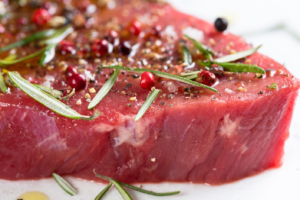A standard ketogenic diet encourages “moderate” protein intake, and therefore there is a fine line between how much is too much or too little. Some people believe too much protein can kick you out of ketosis, while others think too little can hinder your health and fitness goals and leave you feeling hungry.
Protein is a Vital Macronutrient
Protein is an essential component of every healthy diet. Of the three macronutrients — protein, fat, carbs — protein and fat are the only two that are essential to live. Adequate protein consumption is crucial for:
- Hair, nail, and skin health
- Hormonal function
- Building and repairing tissue
- Recovering from workouts
- Losing body fat
On keto, it’s better to eat more protein than it is to eat too little. The best sources of protein on the ketogenic diet should come from animal and whole food sources:
- Fatty cuts of grass-fed beef
- Eggs
- Full-fat dairy products like heavy cream and grass-fed butter
- Fatty fish like salmon, halibut, mackerel, and sardines
- Pork
- Organ meats like liver and heart
- Chicken thighs
If you aren’t hitting your daily protein intake through whole food sources, consider supplementing with whey protein.
Is There Such Thing as Eating Too Much Protein on Keto?
Since the goal of the ketogenic diet is to deplete most glucose stores your body has, people assume that too much protein will prevent your body from running on ketones. But the truth is, our body needs some glucose to survive. This does not mean you need to eat carbohydrates to maintain your health. Gluconeogenesis allows your body to make just enough glucose that your body needs. On keto, GNG is essential for:
- Providing energy to tissues that cannot use ketones
- Replenishing muscle glycogen in athletes
- Mitigating hypoglycemia (low blood sugar)
How Much Protein Should You Eat on Keto?
The first step is to keep carbs under 10% of your total calories, and ideally at 5%.
For most beginners on the keto diet, the best approach is to get 25% of your calories for protein. If you live a very active lifestyle (exercise and weight train intensively more than 3 times a week), you should eat up to 1 gram of protein per pound of body weight, not lean body mass.
Make sure you are also filling in the rest of your calories with healthy fats.
If you’ve recently hit a weight loss stall or feeling lethargic on keto, increasing your protein can help you blast through any plateaus.

